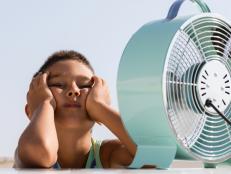Does Lying to Your Kids Have Long Term Effects?
Little white lies we tell our kids seem harmless—but are they really?


JGI/Jamie Grill
We teach our kids that lying is wrong, but we've all likely told our kids little white lies. Like the time you told them the playground was closed when really you just wanted to go home. Or when you told your kids that if they continue to make that face, it will be stuck like that forever. These lies may seem harmless, but some experts agree that the lies we tell our children now could have an effect on their behavior as adults.
According to a new study published in the Journal of Experimental Child Psychology, lying to our kids has detrimental effects and can lead to our children lying when they become adults.
For the study, researchers asked 379 young adults whether their parents lied to them when they were children, how much they lie to their parents now and how well they adjust to adulthood challenges. What they found was that participants who said they were often lied to as children were more likely to lie to their parents now. These participants also reported facing greater difficulty in meeting psychological and social challenges, said they experienced guilt and shame, and described themselves as being selfish and manipulative.
"Parenting by lying can seem to save time, especially when the real reasons behind why parents want children to do something is complicated to explain,” lead author and Assistant Professor Setoh Peipei said. “When parents tell children that 'honesty is the best policy', but display dishonesty by lying, such behavior can send conflicting messages to their children. Parents' dishonesty may eventually erode trust and promote dishonesty in children."
Many of the participants said the lies were based on simple topics like eating, leaving and/or staying, the child misbehaving and money.
Researchers of the study said that they hope these results help parents “consider alternatives to lying, such as acknowledging children's feelings, giving information so children know what to expect, offering choices and problem-solving together."
So, the next time you think about telling your kids a little white lie, remember to practice what you preach—honesty really is the best policy.















